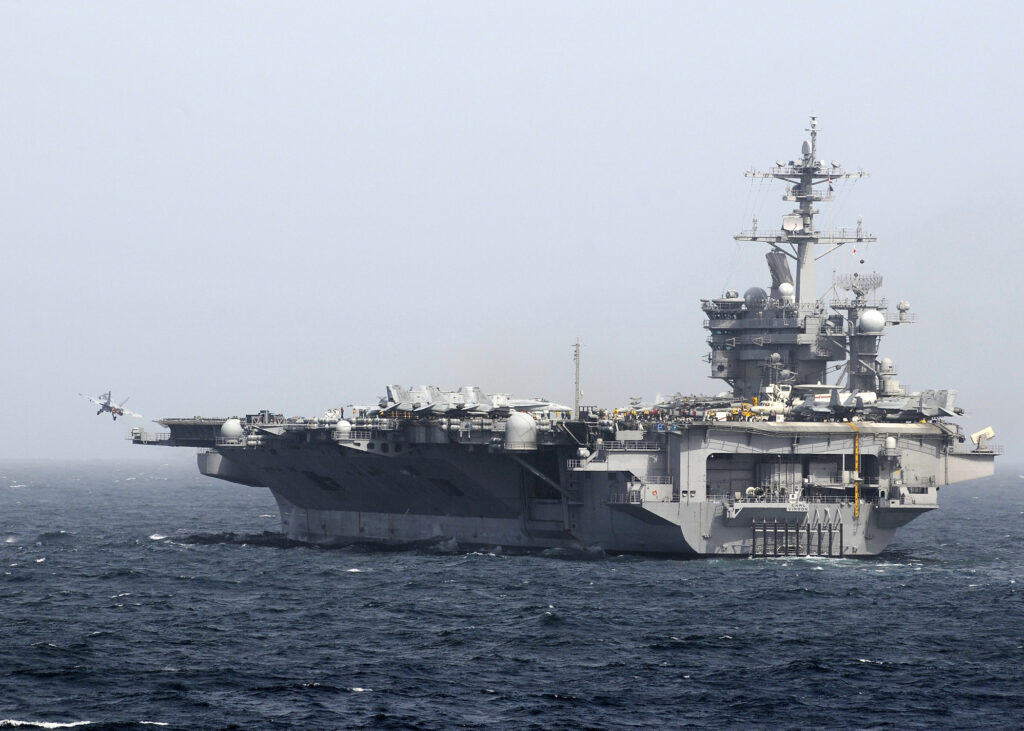 Photo: USN 120213-N-WD757-055
Photo: USN 120213-N-WD757-055

Adam MacDonald is an independent academic based in Halifax. He is a regular contributor to CDA Institute on Asia Pacific issues and provides here a succinct review of the realities facing the US and China as they look to play influential roles concerning North Korea.
Ongoing tensions between the United States and North Korea are creating an unstable situation, where miscalculations and misunderstandings of the interests, intents and risk-taking proclivities of each other could result in war. . Alongside deeply rooted strategic suspicions of the other, the situation is complicated by the need for both sides to save face in front of their domestic constituents; for President Trump to portray the image of a strong, resurgent United States which will not be taken advantage of and for Kim Jong-Un to perpetuate the narrative of North Korea as under constant threat legitimizing the mobilization society onto a permanent war footing, including massive investments in their military and nuclear programs Only Beijing is capable establishing a new strategic status-quo in Northeast Asia which, while not addressing the core issues underpinning these tensions, is able to produce a modicum of stability while affording both Washington and Pyongyang to assert they did not back down against the other.
The most important step is for Beijing is to convince the United States to discard the policy of denuclearization due to the simple fact that the regime of Kim Jong-Un is not willing to give up their nuclear weapons program and there is no practical way of disarming them. Unlike his late-father’s regime—which negotiated with the international community in exchange for food stuffs, fuel and sanctions relief—there is absolutely no appetite now in Pyongyang to discuss any aspect of their nuclear program. Such a desire, or necessity, to negotiate has completely been extinguished, even with mounting economic sanctions and diplomatic isolation forcing North Korea into a state of perpetual poverty, starvation and ostracism from the international community. The deposing of a number of regimes by successive American administrations over the past two decades has cemented North Korea’s belief that the only way to blunt such a future for them is to build a nuclear force capable of striking American assets in theatre, her regional allies, and possibly one day the continental United States itself. What North Korean nuclear strategy is, or if they even possess one, is a point of debate amongst experts. Specifically, is Pyongyang’s ultimate aim to build a secure second-strike retaliatory force (similar to China) to be used after they have been attacked? Or is Pyongyang looking to build a pre-emptive force (similar to Pakistan) designed to degrade a conventionally superior adversary’s military build-up to deter similar behaviour in the future? Absent a formal declaration, Pyongyang’s nuclear strategy remains unknown, but statements and testing patterns suggest that North Korean nuclear developments are in large part motivated to offset conventional and nuclear superiority of the United States and her allies to reduce the possibility of being attacked.
The United States will never formally accept North Korea as a nuclear-armed state. For Beijing, however, the objective is to ensure American policy is a based on North Korean behaviour vice them achieving specific capability milestones, specifically cautioning Washington against declaring ‘red-lines’. Beijing regards the latter as difficult to enforce as any attempt to destroy or seriously degrade North Korea’s nuclear and/or missile programs and inventories would lead to a peninsular conflict. Even a limited American strike against a small set of targets for largely symbolic reasons (i.e. destroying test launch sites) may be interpreted by North Korea as a regime decapitation operation motivating a disproportionate response.
Tolerating Pyongyang as a nuclear-armed state does not entail a complete undermining of the non-proliferation regime if the international community, led by the United States and China, ensure North Korea, while safe from external intervention, remains a small, isolated and poor state unable to entice security or economic concessions from its nuclear capability: an undesirable example for others to follow. North Korea entering the nuclear club, as well, has further motivated China, which resides in a very nuclearized part of the world, to become an ardent supporter of the non-proliferation regime as it emerges as a great power.
China, as well, must convince North Korea to allow them to share their experiences as a nuclear power including the need to develop operational protocols such as robust and reliable command and control procedures delineating clear lines of authority (especially amongst a diverse force spread throughout the country); safety protocols and levels of readiness; and proper storage and handling procedures. Alongside these measures, Beijing should encourage Pyongyang to adopt the language of deterrence, eschewing any notion of using nuclear weapons pre-emptively. It is unlikely China will convince North Korea to adopt a retaliatory nuclear strategy, but promoting the declaration of a policy outlining the conditions under which they would consider using nuclear weapons in a preventative sense (before the expected imitation of expected conflict) will create clarity for Pyongyang’s adversaries and install a degree of predictability in their intentions and actions. As North Korea continues to develop a crude ICBM capability, they may look more favourably on a classic deterrence posture; this is an unacceptable reality to Washington at the moment but may create a more stable long-term nuclear relationship between the two than the developing status quo. Given the secrecy around its nuclear program, and the strained relations between the two, it will be difficult for Beijing to secure Pyongyang’s support, but such measures must be explained as serving their interests specifically by allowing China to be a verification mechanism for the international community of their safe development and employment of nuclear weapons.
Finally, China must take action to convince Pyongyang that acting aggressively will not be rewarded, including eschewing the notion that possession of nuclear weapons will blunt any international response to North Korean conventional military action, including missile attacks against South Korean and American forces. Beijing should publicly state that they will not side with North Korea during any military confrontation but rather their involvement will be conditioned on who initiated the conflict and why. By not blindly supporting their nominal ally, Beijing removes such an expectation for North Korea and the United States which alleviates concerns about an inevitable clash between Washington and Beijing emerging. Beijing, however, will honour its defence commitment to Pyongyang if Washington embarks on a regime change strategy, which will most likely deter large-scale military action being taken. The issue then becomes the more manageable and pragmatic challenge of restraining the most provocative activities of Pyongyang, specifically nuclear and missile tests. Negotiations over this matter are best done discretely by Beijing to allow both sides to save face. Pyongyang, if it entertains such an approach, would most likely want a complete cessation of joint US-South Korean military exercises and possibly the evacuation of all American personnel from the South. This will not happen and thus Beijing must convince North Korea to settle for more limited concessions such as guarantees their regime will not be targeted so long as they do not threaten to attack another state and agreements for both sides that do not substantially alter the conventional balance between them.
China must move beyond advising caution and restrain by both and actively construct the foundations for accepting and operating within a new status-quo: a nuclear-armed North Korea. While an undesirable reality for many, including China, Beijing must use its influence and leverage with both Washington and Pyongyang to diffuse the escalating situation between them by focusing on the real and immediate source of contention: North Korean nuclear and missile testing combined with its language associated with pre-emptive nuclear attacks. Denuclearization is an unrealistic objective and it is premature to create a grand strategic bargain that eliminates the security tensions which plague relations between North Korea and the United States. While it is inaccurate to say that war is inevitable, it should also not be dismissed out of hand that Pyongyang’s possession of nuclear weapons may produce a new strategic equilibrium which reduces the risk of large-scale conflict but serious tensions remaining as the relationship between India and Pakistan has evolved into since they both became nuclear powers. Unlike proliferation optimists who believe mere possession of such weaponry by adversaries will automatically create stability, Beijing must lead and facilitate diplomatic processes to ensure such a scenario could emerge on the Korean Peninsula.